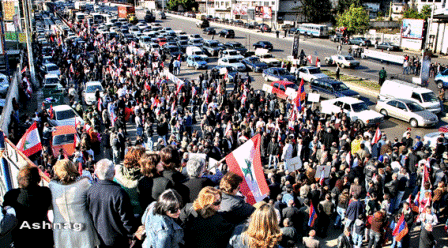 Armenian protest mocks Turkey's peacemaking credentials
Armenian protest mocks Turkey's peacemaking credentials
By Maria Abi-Habib
BEIRUT: About 300 Armenian-Lebanese protested Wednesday's visit to Beirut by Turkish Prime Minister Recep Tayyip Erdogan, arguing that his country's bloody past made it impossible for him to foster reconciliation among Lebanon's squabbling political parties.
“I know what Turkey has done in its past – it murdered Arabs, Armenians and Kurds, all those who wanted to live with Turks,” said Shiraz Djeredjian, an American University of Beirut student. “Now Turkey is coming because they want to join the EU, but we know they can't be mediators. It's not in their culture to be peacekeepers; their culture is blood and murder – murder is in their blood.”
Erdogan visited Lebanon to help broker an agreement between the Lebanese government and its opposition.
Turkish peacekeeping troops which constitute part of the United Nations Interim Force in Lebanon (UNIFIL) were also on the visit's agenda.
Yet the Armenian diaspora in Lebanon is skeptical about Turkey's intentions.
“The main issue is that we know [Turkey's] history and I don't trust them,” said Vatche Moughalian, 31. “Just recently Turkey refused to open its sea ports to Cyprus. They are coming here to show they can be mediators to get into the EU. Let them try to sort out their own country's relations first. Then maybe we'll start trusting them.”
Turkey does not recognize the killing of 1.5 million Armenians in 1915-17 or accept that the massacres were attempted genocide. Instead, Turkey claims the deaths were the result of inter-ethnic discord, disease and famine that plagued the region during World War I.
Turkey's vehement genocide denial is one of several obstacles the country faces in its bid to join the EU. Out of 27 EU countries, 12 believe the Armenian deaths were genocidal.
Lebanon's Parliament officially recognized the genocide in 2000, the only Middle Eastern country to do so. In total, 16 countries worldwide officially believe Turkey attempted Armenian genocide.
Armenians were forced to flee from Turkey through Syria. Many survivors settled in Lebanon. By 1926 there were 75,000 Armenians in Lebanon.
“In Lebanon we are diverse peoples living together,” said Shadia Hashem, who is not Armenian but attended the protest to show her solidarity. “How can the government bring someone from Turkey when that country has historically divided and persecuted non-Turks?”
In the Ottoman Empire, which included Lebanon, non-Turks and non-Muslims often bore the brunt of discrimination.
Many protesters were thankful for the support Lebanon's government has given to Armenians, though they were offended Erdogan was invited to Beirut.
“We don't want Turkish troops or politicians in Lebanon, as Lebanon is our second home and we love it,” said Vanig Dakessian. “How can a country that [created] genocides in the 20th century – not only of Armenians – come to make peace without first apologizing?”
Source: Special to ?The Daily Star?, Beirut, 04 January 2007
http://www.dailystar.com.lb/article.asp?edition_id=1&categ_id=1&article_id=78166
ADDITIONAL READING
Excerpt from a report by Associated Press (03 January 2006):
While Erdogan was meeting Saniora, thousands of Armenians, raising Lebanese and Armenian flags, gathered in the streets north of Beirut shouting slogans against the Turkish premier's visit, witnesses said. All shops in the Armenian neighborhood of Bourj Hammoud north of Beirut closed for a couple of hours.
“Turkey, Israel's strategic ally, cannot keep peace in Lebanon,” read a placard by the protesters. The protesters dispersed peacefully but the demonstration caused a traffic jam on Beirut's northern highway.
Ahead of Erdogan's arrival, about 100 Armenian citizens, waving Lebanese flags, also gathered outside the Beirut airport to protest his visit.
In October, thousands from Lebanon's 80,000-100,000 strong Armenian community rallied in downtown Beirut to protest Turkish participation in the U.N. peacekeeping force because they blame Turkey's Ottoman rulers for the mass killing of Armenians in the early 20th century.
END OF THE EXCERPT
NOTE by Azad-Hye: “Turkey, Israel's strategic ally, cannot keep peace in Lebanon,? was only one of many placards that the Armenians were carrying that day. Associated Press reporter chose to ignore the other placards for obvious reasons.
Previous articles in our website on the same subject:
 Armenian protest mocks
Armenian protest mocks 